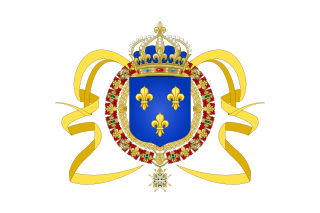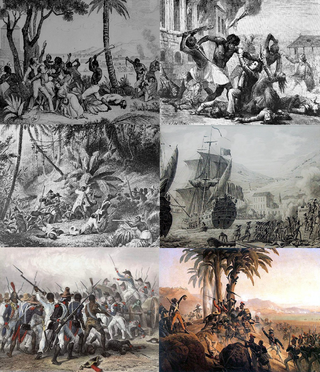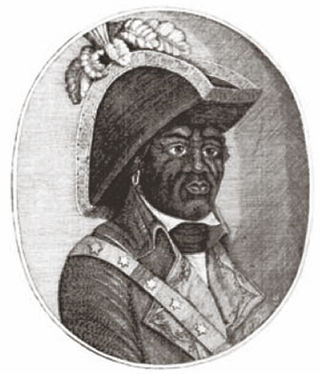
François-Dominique Toussaint Louverture also known as Toussaint L'Ouverture or Toussaint Bréda, was a Haitian general and the most prominent leader of the Haitian Revolution. During his life, Louverture first fought and allied with Spanish forces against Saint-Domingue Royalists, then joined with Republican France, becoming Governor-General-for-life of Saint-Domingue, and lastly fought against Bonaparte's republican troops. As a revolutionary leader, Louverture displayed military and political acumen that helped transform the fledgling slave rebellion into a revolutionary movement. Along with Jean-Jacques Dessalines, Louverture is now known as one of the "Fathers of Haiti".

Jean-Jacques Dessalines was the first Haitian Emperor, leader of the Haitian Revolution, and the first ruler of an independent Haiti under the 1805 constitution. Initially regarded as governor-general, Dessalines was later named Emperor of Haiti as Jacques I (1804–1806) by generals of the Haitian Revolutionary army and ruled in that capacity until being assassinated in 1806. He spearheaded the resistance against French rule of Saint-Domingue, and eventually became the architect of the 1804 massacre of the remaining French residents of newly independent Haiti, including some supporters of the revolution. Alongside Toussaint Louverture, he has been referred to as one of the fathers of the nation of Haiti. Dessalines was directly responsible for the country, and, under his rule, Haiti became the first country in the Americas to permanently abolish slavery.

Saint-Domingue was a French colony in the western portion of the Caribbean island of Hispaniola, in the area of modern-day Haiti, from 1697 to 1804. The name derives from the Spanish main city on the island, Santo Domingo, which came to refer specifically to the Spanish-held Captaincy General of Santo Domingo, now the Dominican Republic. The borders between the two were fluid and changed over time until they were finally solidified in the Dominican War of Independence in 1844.

Divisional-General Charles Victoire Emmanuel Leclerc was a French Army officer who served during the French Revolutionary Wars. He was the husband of Pauline Bonaparte, the sister of Napoleon. In 1801, Leclerc was sent to Saint-Domingue, where invasion forces under his command captured and deported Haitian leader Toussaint Louverture to France as part of an unsuccessful attempt to reassert French control over Saint-Domingue and reinstate slavery in the colony. Leclerc died of yellow fever during the campaign.

Alexandre Sabès Pétion was the first president of the Republic of Haiti from 1807 until his death in 1818. One of Haiti's founding fathers, Pétion belonged to the revolutionary quartet that also includes Toussaint Louverture, Jean-Jacques Dessalines, and his later rival Henri Christophe. Regarded as an excellent artilleryman in his early adulthood, Pétion would distinguish himself as an esteemed military commander with experience leading both French and Haitian troops. The 1802 coalition formed by him and Dessalines against French forces led by Charles Leclerc would prove to be a watershed moment in the decade-long conflict, eventually culminating in the decisive Haitian victory at the Battle of Vertières in 1803.

The Haitian Revolution was a successful insurrection by self-liberated slaves against French colonial rule in Saint-Domingue, now the sovereign state of Haiti. The revolution was the only known slave uprising in human history that led to the founding of a state which was both free from slavery and ruled by non-whites and former captives.

George Biassou was an early leader of the 1791 slave rising in Saint-Domingue that began the Haitian Revolution. With Jean-François and Jeannot, he was prophesied by the vodou priest Dutty Boukman to lead the revolution.

Benoit Joseph André Rigaud was the leading mulatto military leader during the Haitian Revolution. Among his protégés were Alexandre Pétion and Jean-Pierre Boyer, both future presidents of Haïti.

The Haitian Revolution and the subsequent independence of Haiti as an independent state provoked mixed reactions in the United States. Among many white Americans, this led to uneasiness, instilling fears of racial instability on its own soil and possible problems with foreign relations and trade between the two countries. Among enslaved black Americans, it fueled hope that the principles of the recent American Revolution might be realized in their own liberation. While the Haitian Revolution was occurring during the presidencies of George Washington and John Adams, members of the Federalist Party including Alexander Hamilton supported Toussaint Louverture and his revolution. John Adams appointed Edward Stevens as US consul-general to Haiti to forge a closer relationship between the two nations and express US support for Louverture's government.

Lieutenant General The Right Honourable Sir Thomas Maitland was a British soldier and British colonial governor. He also served as a Member of Parliament for Haddington from 1790 to 1796, 1802–06 and 1812–13. He was made a Privy Councillor on 23 November 1803. He was the second surviving son of James Maitland, 7th Earl of Lauderdale, and the younger brother of James Maitland, 8th Earl of Lauderdale. Maitland never married.

Gabriel-Marie-Théodore-Joseph, comte d'Hédouville was a French soldier and diplomat.
The War of Knives, also known as the War of the South, was a civil war from June 1799 to July 1800 between the Haitian revolutionary Toussaint Louverture, a black ex-slave who controlled the north of Saint-Domingue, and his adversary André Rigaud, a mixed-race free person of color who controlled the south. Louverture and Rigaud fought over de facto control of the French colony of Saint-Domingue during the war. Their conflict followed the withdrawal of British forces from the colony earlier during the Haitian Revolution. The war resulted in Toussaint taking control of the entirety of Saint-Domingue, and Rigaud fleeing into exile.

In the history of the Dominican Republic, the period of Era de Francia occurred in 1795 when France acquired the Captaincy General of Santo Domingo, annexed it into Saint-Domingue and briefly came to acquire the whole island of Hispaniola by the way of the Treaty of Basel, allowing Spain to cede the eastern province as a consequence of the French Revolutionary Wars.

The Saint-Domingue expedition was a large French military invasion sent by Napoleon Bonaparte, then First Consul, under his brother-in-law Charles Victor Emmanuel Leclerc in an attempt to regain French control of the Caribbean colony of Saint-Domingue on the island of Hispaniola, and curtail the measures of independence and abolition of slaves taken by the former slave Toussaint Louverture. It departed in December 1801 and, after initial success, ended in a French defeat at the Battle of Vertières and the departure of French troops in December 1803. The defeat forever ended Napoleon's dreams of a French empire in the West.
Joseph R. E. Bunel was a representative of the Haitian Revolutionary Government, who negotiated the first trade agreement between his nation and the United States, in 1799.
Edward Stevens, FRSE was an Antiguan-born physician and diplomat. A close friend of American statesman Alexander Hamilton, Stevens played a major role in the American response to the Haitian Revolution.

The Indigenous Army, also known as the Army of Saint-Domingue was the name bestowed to the coalition of anti-slavery men and women who fought in the Haitian Revolution in Saint-Domingue. Encompassing both black slaves, maroons, and affranchis, the rebels were not officially titled the Armée indigène until January 1803, under the leadership of then-general Jean-Jacques Dessalines. Predated by insurrectionists such as François Mackandal, Vincent Ogé and Dutty Boukman, Toussaint Louverture, succeeded by Dessalines, led, organized, and consolidated the rebellion. The now full-fledged fighting force utilized its manpower advantage and strategic capacity to overwhelm French troops, ensuring the Haitian Revolution was the most successful of its kind.
Étienne Maynaud de Bizefranc de Laveaux was a French general who was Governor of Saint-Domingue from 1793 to 1796 during the French Revolution. He ensured that the law that freed the slaves was enforced, and supported the black leader Toussaint Louverture, who later established the independent republic of Haiti. After the Bourbon Restoration he was Deputy for Saône-et-Loire from 1820 to 1823.
In 1789, France's National Constituent Assembly made the Declaration of the Rights of Man and of the Citizen. In 1791, the enslaved Africans of Saint-Domingue began the Haitian Revolution, aimed at the overthrow of the colonial reign.

Haiti–United Kingdom relations refers to the international relations between Haiti and the United Kingdom. The Embassy of the United Kingdom in Port-au-Prince is accredited to Haiti, as is the British Embassy and Ambassador in Santo Domingo, Dominican Republic, while Haiti has an embassy in London and a consulates-general in Providenciales in Turks and Caicos Islands. While the two countries have maintained formal diplomatic recognition since 1859, the United Kingdom has maintained de facto diplomatic relations since Haiti's independence in 1804. The two countries maintain a maritime border between Haiti and the British-governed Turks and Caicos Islands.














